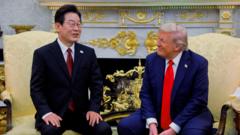Will US Investment Decline After South Korea's Raid?

Published: 2025-09-11 03:07:12 | Category: technology
Following a significant immigration raid at a Hyundai plant in Georgia, South Korean companies are reportedly feeling cautious about future investments in the United States. President Lee Jae-myung expressed concerns about the implications of the raid, which involved the detention of over 300 South Koreans. This incident has raised questions about the viability of establishing manufacturing operations in the US, especially within the context of ongoing trade discussions.
Last updated: 24 October 2023 (BST)
Key Takeaways from the Immigration Raid
- Over 300 South Korean workers were detained during the raid, impacting perceptions of the US as an investment destination.
- The raid has raised concerns about the implications for South Korean firms' ability to send workers to establish facilities abroad.
- US officials defended the operation, stating it aligns with immigration enforcement laws.
- South Korea has committed to substantial investments in the US, making the timing of the raid particularly sensitive.
- The situation has sparked discussions about the future of US-South Korea trade relations.
Background of the Immigration Raid
On a recent day in Georgia, US immigration officials conducted a raid at a Hyundai plant, resulting in the detention of nearly 475 individuals, with more than 300 being South Korean nationals. These workers were reportedly involved in setting up production lines at the site, which is part of one of the largest foreign investment projects in Georgia.
The raid has been described as bewildering by President Lee Jae-myung of South Korea, who emphasised that it is common practice for South Korean companies to deploy workers internationally to assist in the establishment of manufacturing facilities. “If that’s no longer allowed, establishing manufacturing facilities in the US will only become more difficult,” he stated, highlighting the potential negative impact on future investments.
Impacts on South Korean Investment Plans
The implications of the raid extend beyond immediate concerns for the workers involved. South Korea has pledged to invest tens of billions of pounds in the United States, partly as a response to the tariffs imposed on its exports. However, the recent crackdown has prompted South Korean businesses to reassess the risks associated with investing in the US market.
President Lee indicated that the incident has made companies question whether establishing manufacturing facilities in the US is worthwhile. The timing of the raid is particularly concerning, as it coincides with sensitive trade talks between the US and South Korea, raising fears about the potential for long-term diplomatic and economic repercussions.
Reactions from US Officials
Despite the concerns raised in South Korea, US officials have defended the operation, arguing that it was necessary to enforce immigration laws. President Donald Trump referenced the raid in a social media post, urging foreign companies to prioritise hiring American workers. He reassured that the US government would facilitate the legal entry of foreign workers if companies adhered to immigration regulations.
The US administration's stance suggests a commitment to enforcing immigration laws while also attempting to maintain an attractive environment for foreign investments. However, the mixed signals could complicate relationships with key allies like South Korea, who are critical for maintaining a robust international trade landscape.
The Broader Context of US-South Korea Relations
US-South Korea relations have historically been characterised by strong economic ties, underpinned by shared strategic interests. South Korea is a close ally of the US in Asia, and the two countries have collaborated on various initiatives, including trade agreements and security partnerships.
However, the recent immigration raid has introduced an element of uncertainty into this relationship. As South Korean firms weigh the risks of investing heavily in the US, the implications for future collaborations could be significant. The potential hesitance to invest might lead to a slowdown in the economic growth that both countries have been working to achieve together.
What Happens Next?
As the dust settles from the immigration raid, several key factors will likely influence the future of South Korean investment in the US. First, the response from South Korean companies will be critical. Some may choose to delay or scale back their investment plans, while others might seek to navigate the complexities of the US immigration system more cautiously.
Additionally, ongoing trade discussions between the US and South Korea will play a pivotal role in shaping the future landscape. If the US government can address concerns about worker mobility while reassuring South Korean firms of a welcoming investment environment, it may mitigate some of the hesitance stemming from the raid.
Ultimately, the outcome of this situation will depend on how both governments approach the issues at hand. As they navigate their economic relationship, the necessity for clarity and mutual understanding will become increasingly crucial.
FAQs
What was the reason for the immigration raid at the Hyundai plant?
The immigration raid was conducted by US officials to enforce immigration laws, leading to the detention of over 300 South Korean workers who were allegedly working illegally at the facility.
How has the South Korean government reacted to the raid?
President Lee Jae-myung expressed that the situation is bewildering and raised concerns about the implications for South Korean firms considering future investments in the US.
What are the potential impacts on US-South Korea trade relations?
The raid could complicate trade relations, as South Korean companies may become hesitant to invest in the US, questioning the feasibility of establishing manufacturing facilities due to immigration concerns.
What assurances has the US government provided to foreign companies?
President Trump stated that the US government would make it easier for foreign firms to bring workers into the country, provided they comply with immigration laws, aiming to maintain a welcoming environment for investments.
How many people were detained during the raid?
During the raid, US officials detained approximately 475 individuals, with more than 300 identified as South Korean nationals employed at the Hyundai plant.
As the situation unfolds, it will be essential for both the US and South Korea to navigate their economic ties carefully to ensure mutual benefits. What steps might be taken to restore confidence in international investments? #SouthKorea #USInvestment #ImmigrationPolicy


